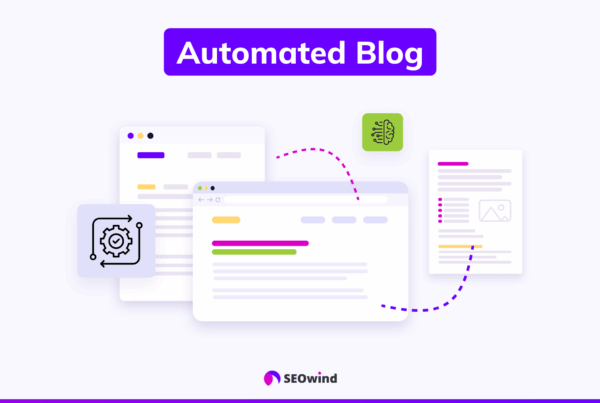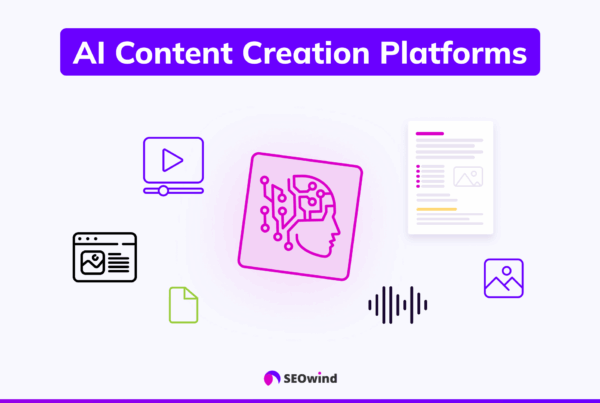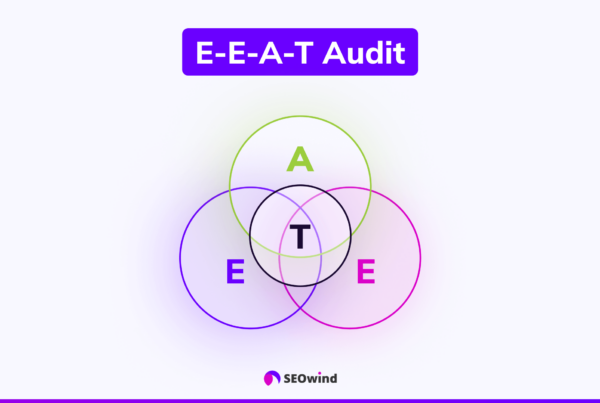Businesses need to boost their online visibility to stay competitive these days. AI in SEO has completely changed how companies approach digital marketing, offering amazing opportunities to grow their online presence while keeping quality high. This guide explores how AI SEO agencies use cutting-edge tech to deliver results across different industries.
What is an AI SEO Agency?
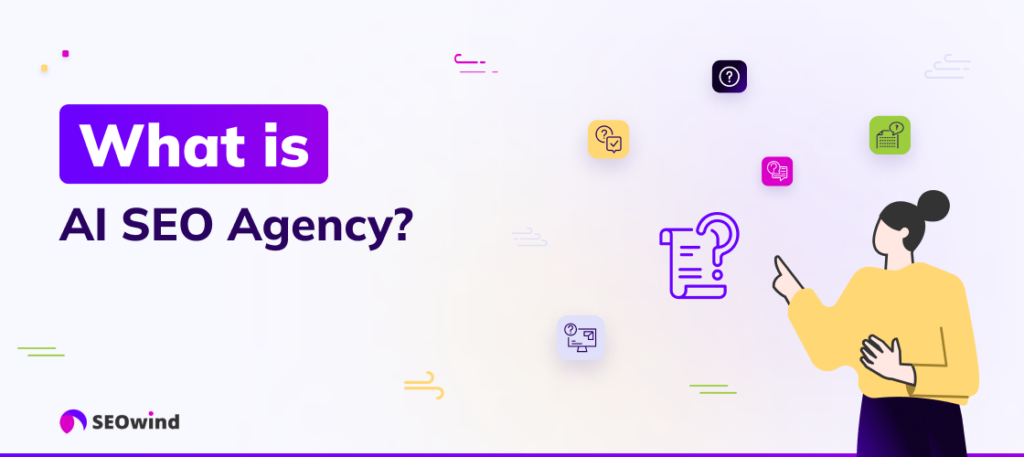
An AI SEO Agency blends artificial intelligence with SEO expertise to boost website visibility in search results. Unlike old-school agencies that rely on manual work, AI-powered agencies use machine learning, natural language processing (NLP), predictive analytics, and automated systems to revolutionize SEO.
These agencies analyze huge datasets quickly, uncovering key insights about search algorithms, user behavior, and competitive landscapes. This tech foundation helps them develop smarter optimization strategies that adapt to the ever-changing digital world. The result? Faster implementation, more accurate predictions, and better performance than traditional methods.
Recent data shows AI-enhanced SEO campaigns deliver 65% better overall SEO results, including higher conversion rates, than traditional approaches. This performance gap exists because AI can process and analyze massive amounts of data while constantly learning from outcomes to improve future strategies.
Their hybrid approach – combining algorithmic efficiency with human creativity and strategic thinking- sets advanced AI SEO agencies apart. This CyborgMethod represents digital marketing’s future, where technology enhances human capabilities rather than replacing them.
AI SEO vs. Traditional SEO: A Direct Comparison
Before diving into specific tools and strategies, let’s understand the key differences between AI-powered and traditional SEO approaches:
| Metric | Traditional SEO | AI-Enhanced SEO |
|---|---|---|
| Traffic Growth | Moderate, gradual | Higher, more rapid, sustained |
| Ranking Improvements | Slower, manual adjustments | Faster, automated adaptations |
| Average ROI | Good (up to 550%) | Higher, more predictable |
| Implementation Speed | Days/weeks | Hours/minutes |
| Data Analysis | Limited, sample-based | Comprehensive, real-time |
| Adaptability | Reactive | Proactive & scalable |
| Content Creation | Time-intensive, limited scale | Efficient, highly scalable |
This performance gap shows AI’s ability to process information at scale while constantly learning from outcomes. For businesses looking for a competitive edge, this means faster optimization implementation, more accurate predictions, and ultimately better performance metrics with 49.2% of businesses reporting improved rankings after implementing AI-driven strategies.
Google’s Current Stance on AI-Generated Content
Understanding Google’s position on AI-generated content is crucial for effective and compliant AI SEO strategies. Google has significantly changed its guidance from 2023 to 2024, shifting from focusing on who created the content to focusing on its value.
In their September 2023 helpful content guidelines update, Google removed the phrase “written by people,” clarifying that content origin is less important than its utility for users. The updated guidance now emphasizes “Helpful content created for people in search results.”
In their February 2023 blog post, Google stated that the appropriate use of AI or automation isn’t against their guidelines as long as “it is not used to generate content primarily to manipulate search rankings.”
This distinction is key: Google now evaluates content based on its value to users rather than how it was created. John Mueller, Senior Search Analyst at Google, noted that quality raters are instructed to potentially rate content as “lowest quality” only if AI-generated content lacks trustworthiness or seems spammy, not simply because it’s AI-generated.
For AI SEO agencies, this means focusing on creating content that:
- Puts user needs above search engine manipulation
- Maintains high quality, reliability, and trustworthiness
- Follows all other Google content policies
- Delivers genuine value beyond just ranking for keywords
SEOwind – Top AI SEO Agency built by Founders for Growth
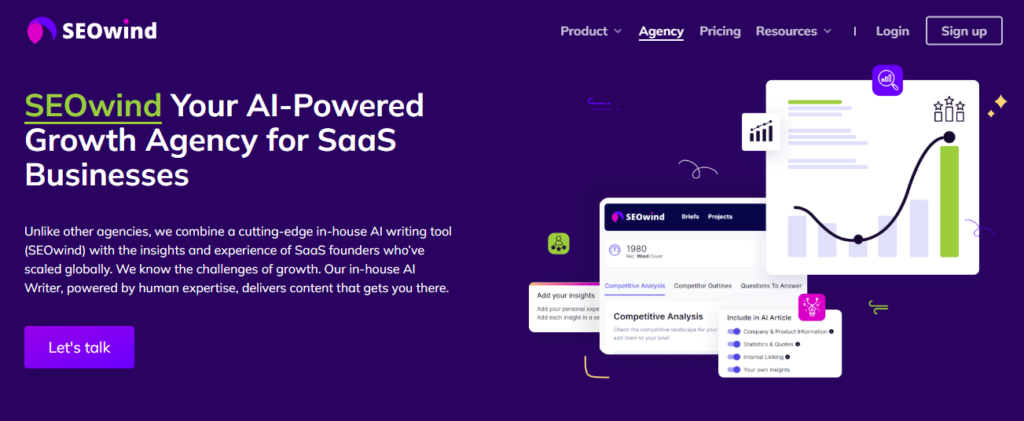
Scalability, consistency, and strategic adaptability are the cornerstones of a strong digital presence. SEOwind isn’t your typical AI SEO agency. We didn’t just learn SEO – we lived it, scaling our own SaaS company to customers in over 100 countries. That hands-on growth journey is baked into everything we do. We’re not guessing what works. We know. Because we’ve done it ourselves with lean teams, big ambitions, and results that speak louder than slide decks ever could.
Real SaaS Founders. Not Just Consultants.
SEOwind was founded by Tom Winter and Kate Kandefer. two SaaS operators who’ve scaled globally without bloated teams or generic playbooks. We know what it takes to drive growth and how to cut through noise with AI that works.
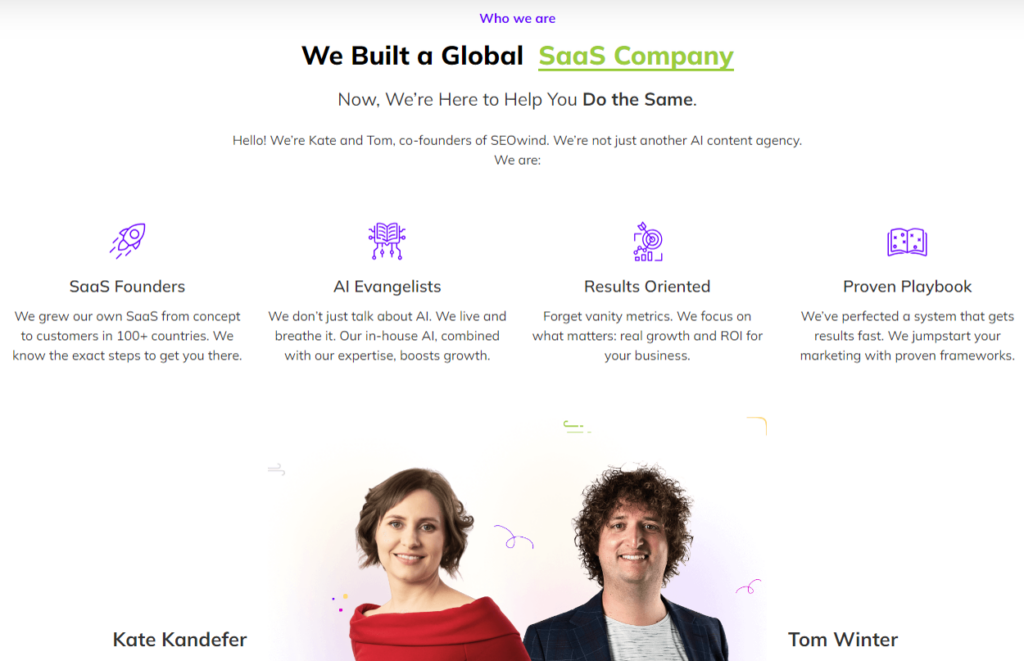
We’re Not Just AI Users. We’re AI Builders
Most agencies use off-the-shelf tools. We build our own. That’s a massive difference when speed, scale, and specificity matter. It means we’re not at the mercy of third-party limitations. We control the tech, the outputs, and the process. That control leads to faster turnarounds, higher content quality, and systems that actually scale with your business, whether you need a fully managed solution or want us to train your in-house team to run AI content like pros.
AI That Works Because It’s Built for Performance, Not Promises
At the heart of SEOwind is our proprietary AI Writer – a platform we developed in-house to crush the two biggest problems in content marketing: speed and quality. While most AI tools spit out generic filler, ours leverages Retrieval Augmented Generation (RAG) to fuse real-world research, internal company data, and SEO insights into high-performing, brand-aligned content. Articles that used to take 12+ hours now take under 60 minutes and they don’t just fill space, they rank. Better yet, they convert.
The same goes for content updates that you can do with our SEOwind tool. The AI workflows and agents we’ve built increase E-E-A-T of each article each time.

What Makes SEOwind Different?
We bring together strategic thinking, SaaS growth experience, and technical execution into one tight, efficient machine. Unlike most consultants, we don’t just show you what to do. We help you get it done. Unlike most agencies, we build systems that scale your growth. Our edge isn’t just AI. It’s the combination of founder mindset, custom tools, and relentless focus on ROI.
If you’re serious about scaling your SEO with smart, AI-powered systems and you’re tired of fluff then SEOwind is built for you.
With SEOwind, businesses can:
- Save time and costs by reducing content production from 12-17 hours to under 60 minutes.
- Outrank competitors by generating articles that align with Google’s E-E-A-T (Experience, Expertise, Authoritativeness, Trustworthiness) principles.
- Leverage AI without sacrificing authenticity, thanks to our unique integration of internal brand insights and external research.
Let’s talk growth.

AI Tools for SEO
An effective AI SEO agency uses specialized tools across various optimization functions. Understanding these tools shows how agencies leverage technology to improve search visibility.
Keyword Research and Analysis
AI-driven keyword research has evolved way beyond basic volume and difficulty metrics. Today’s advanced tools use predictive modeling to identify opportunities before they become competitive.
Modern keyword platforms like Semrush’s Keyword Magic Tool and Ahrefs’ Keywords Explorer use machine learning algorithms to:
- Group related keywords into meaningful topic clusters
- Identify search intent patterns across keyword variations
- Predict seasonal trends and interest fluctuations
- Find content gaps compared to competitors
These capabilities help agencies develop more comprehensive keyword strategies that align with user needs rather than just chasing volume.
Content Optimization
Content optimization tools have progressed from basic keyword density checkers to sophisticated content intelligence platforms that evaluate multiple quality factors:
- Semantic relevance to search intent
- Topical depth and comprehensiveness
- Readability and engagement metrics
- Competitive content gaps
Advanced agencies use AI-driven editing tools like Grammarly Business and specialized SEO platforms to ensure content satisfies human readers and search algorithms. These tools help optimize critical on-page elements like meta titles, meta descriptions, and header structure to improve click-through rates and engagement.
AI Content Writing
Content creation has been transformed by AI writing assistants that generate high-quality drafts at scale. Platforms like SEOwind combine large language models with SEO data to create engaging and optimized content.
These systems typically work within structured frameworks, where:
- AI analyzes top-ranking content to understand winning patterns
- Human editors provide strategic direction through detailed briefs
- AI generates initial drafts based on these inputs
- Human experts review and refine for quality and brand voice
This hybrid approach allows for significant content scaling without sacrificing quality or originality, with 75% of marketers now using AI to automate manual tasks like keyword research and content optimization.
SERP Analysis and Competitive Intelligence
AI-powered SERP analysis tools provide unprecedented insight into search landscapes and competitive positioning. These platforms analyze hundreds of ranking factors to identify specific optimization opportunities.
Leading agencies use tools like Ahrefs, SEMrush, and proprietary systems to:
- Track position changes across thousands of keywords
- Identify featured snippet opportunities
- Analyze competitor content strategies
- Monitor search intent shifts in real-time
This intelligence allows for data-driven strategy adjustments that keep pace with evolving search landscapes.
The CyborgMethod™: A Hybrid Approach to AI SEO
Creating high-performing SEO content isn’t just about using AI tools—it’s about building systems that combine technology with human expertise. The CyborgMethod™ exemplifies this approach by integrating AI capabilities throughout the content workflow while maintaining strategic human oversight.
This systematic approach follows a multi-step structure that leverages AI at each stage:
1. AI-Driven Research
The foundation begins with comprehensive research where AI analyzes:
- SERP data to understand search intent patterns
- Competitor content to identify structural elements and topics
- User questions from platforms like Reddit and Quora
- Performance data from sources like Google Search Console
This research stage often represents 80% of the work, establishing the foundation for content that genuinely answers user needs.
2. Strategic Brief Development
AI helps create comprehensive content briefs that serve as roadmaps, including:
- Detailed outlines with heading structures
- Tone and voice guidelines
- Required topics and subtopics
- E-E-A-T principles and requirements
These briefs provide clear direction for the AI writing phase, treating the AI as a junior writer who needs specific guidance.
3. AI Content Generation
Using the research and brief, AI generates initial content drafts that:
- Address key topics identified in the research
- Follow the structure outlined in the brief
- Incorporate relevant keywords naturally
- Maintain specified tone and style
This draft is a starting point that will be refined through subsequent steps.
4. Analysis and Refinement
An evaluation agent (or second AI pass) reviews the draft to identify:
- Structural gaps in content
- Weak arguments or explanations
- Clarity issues or redundancies
- SEO optimization opportunities
This critical analysis phase improves content quality before human editing.
5. Technical SEO Enhancement
AI tools then enhance the content with the following:
- Strategic internal linking to build topical clusters
- Schema markup recommendations
- Metadata optimization
- Core Web Vital improvements
6. Human Expert Editing
The final and crucial step involves human experts who:
- Verify factual accuracy and sources
- Ensure brand voice consistency
- Add unique insights and expertise
- Confirm E-E-A-T compliance
This systematic approach allows agencies to scale content production without sacrificing quality or originality. It represents a fundamental shift from viewing AI as a tool to viewing it as a collaborator within a structured workflow.en personalized marketing and craftwork, thus maximizing success rates substantially further!
Comparing CyborgMethod™ to Other Industry Approaches
The CyborgMethod™ differs significantly from other common AI SEO approaches in the market. Understanding these differences helps businesses select the methodology that best aligns with their needs and values:
CyborgMethod™ vs. Full AI Automation
While some agencies rely on complete automation with minimal human involvement, the CyborgMethod™ maintains human expertise at strategic points:
| Feature | CyborgMethod™ | Full AI Automation |
|---|---|---|
| Research Depth | Human-guided, AI-powered | Algorithm-determined |
| Creative Direction | Human strategy, AI execution | AI-determined direction |
| Quality Control | Multi-stage human review | Automated checks |
| E-E-A-T Integration | Expert verification and enhancement | Limited or missing |
| Adaptability | Responsive to feedback | Fixed algorithmic processes |
CyborgMethod™ vs. Prompt-Based Approaches
Many agencies use simple prompt engineering to generate content, while the CyborgMethod™ employs a structured system:
| Feature | CyborgMethod™ | Prompt-Based Approach |
|---|---|---|
| Process Structure | Defined stages | Single-stage generation |
| Research Integration | Built into system | Dependent on prompt quality |
| Quality Consistency | Systematic quality controls | Variable based on prompt |
| Scalability | Highly repeatable process | Inconsistent results at scale |
| SEO Integration | Seamless throughout workflow | Often separate from content |
CyborgMethod™ vs. Traditional SEO with AI Tools
Traditional agencies often bolt AI tools onto existing workflows, while CyborgMethod™ represents a ground-up redesign:
| Feature | CyborgMethod™ | Traditional + AI Tools |
|---|---|---|
| System Design | AI-native methodology | AI as supplementary tool |
| Workflow Integration | End-to-end system | Fragmented tool usage |
| Speed & Efficiency | Streamlined process | Bottlenecks at human stages |
| Cost Effectiveness | Optimized resource allocation | Resource-intensive process |
| Output Quality | Consistent excellence | Variable quality |
This comparative analysis shows why structured AI systems like the CyborgMethod™ deliver better results compared to either fully automated approaches or traditional methods with AI features added as afterthoughts.
AI SEO Strategies That Deliver Results
Effective AI SEO agencies develop comprehensive strategies that leverage technology across multiple optimization dimensions. These approaches are fundamentally different from traditional SEO tactics in both scale and sophistication.
Data-Driven Decision Making
Modern AI SEO strategies replace gut feelings with hard data by:
- Processing huge datasets from multiple sources to find patterns human analysts might miss
- Using predictive modeling to forecast keyword trends and algorithm changes
- Continuously testing and refining approaches based on performance data
- Creating custom algorithms that adapt to specific business contexts
This data-driven approach ensures optimizations are based on objective analysis rather than assumptions or outdated tactics.
Content Scaling Through Intelligent Automation
Leading agencies use AI to scale content production without compromising quality:
- Automated content briefs based on competitive analysis ensure comprehensive coverage
- AI draft generation creates initial content quickly
- Intelligent editing tools refine messaging and readability
- Quality assurance systems verify adherence to content standards
This approach allows businesses to build comprehensive content libraries that establish topical authority across their industry, with AI automation now powering up to 45.5% of all SEO tasks.
Predictive SEO and Opportunity Identification
Rather than reacting to algorithm changes after they happen, AI-powered strategies anticipate shifts:
- Continuous monitoring of SERP features identifies emerging opportunities
- Automated market gap analysis highlights untapped potential
- Ranking volatility patterns signal algorithm shifts before they’re announced
- Content performance predictions guide resource allocation
This forward-looking approach keeps businesses ahead of competitors who rely on reactive strategies.
Personalization at Scale
AI enables unprecedented content personalization that improves user engagement:
- Dynamic content elements that adapt to user interests
- Location-specific optimizations for local search
- Device-specific format adjustments
- Behavioral targeting based on user journey stage
This personalization enhances user experience while sending positive engagement signals to search algorithms.
Advantages of AI SEO Agency
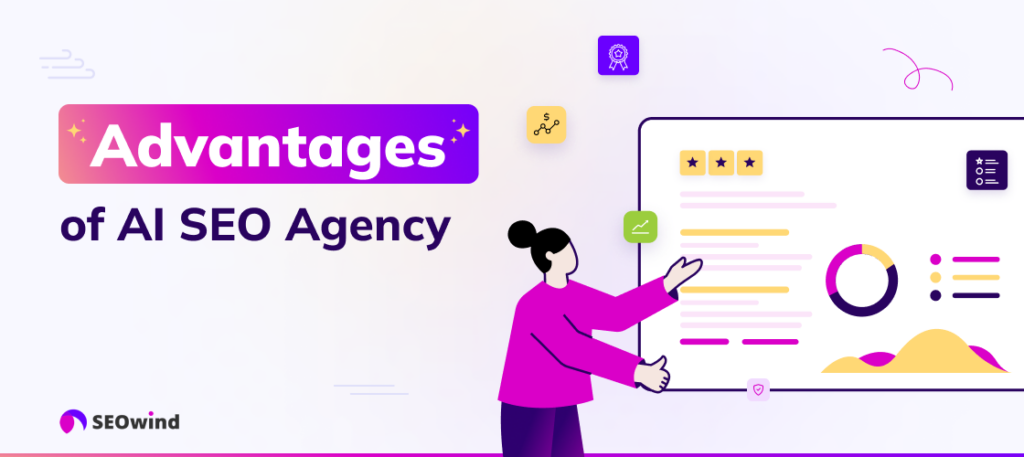
The integration of artificial intelligence into SEO delivers specific, measurable advantages that directly impact business outcomes:
Data Processing at Scale
AI’s most fundamental advantage is its ability to process and analyze massive datasets that would overwhelm human teams:
- Analyzing millions of keywords and search trends simultaneously
- Processing competitive data across thousands of URLs
- Monitoring technical performance across entire websites daily
- Tracking algorithm impacts across multiple industries
This scale of analysis enables more informed decisions based on comprehensive data rather than limited samples.
Efficiency and Resource Optimization
AI significantly reduces the time and resources required for SEO implementation:
- Automating repetitive tasks like keyword research, content briefs, and performance reporting
- Reducing content production time by 60-70% through AI-assisted drafting
- Streamlining technical audits through automated issue detection and prioritization
- Enabling small teams to manage enterprise-scale SEO programs
These efficiency gains allow businesses to reallocate resources to strategic thinking rather than execution. AI saves over 10 hours weekly for 15.6% of users, directly translating to lower labor costs and higher ROI.
Precision Targeting and Intent Matching
Modern AI systems excel at matching content to user needs:
- Identifying the specific questions users ask at different funnel stages
- Mapping content to precise search intents beyond basic keyword matching
- Understanding semantic relationships between topics to build comprehensive clusters
- Recognizing intent shifts over time and adapting content accordingly
This precision ensures content delivers value to users while satisfying search engine quality criteria.
Agility and Adaptability
Perhaps most importantly, AI enables unprecedented adaptability:
- Real-time SERP monitoring detects algorithm changes as they happen
- Automated content updates maintain freshness and relevance
- Dynamic optimization adjusts to performance feedback
- Rapid testing of new approaches identifies winning strategies quickly
In an environment where search algorithms change constantly, this adaptability represents a critical competitive advantage.
Real-World Results: Case Studies and Success Stories
Theoretical advantages mean little without proven results. The following case studies demonstrate AI SEO’s impact across different industries:
Case Study: The #100Posts30DaysChallenge
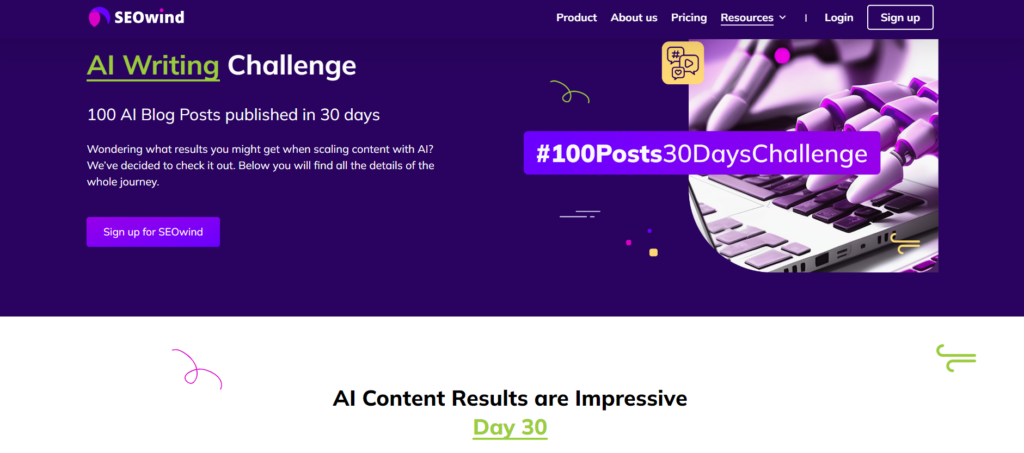
SEOwind’s AI Writing Challenge provides compelling evidence of AI’s content scaling capabilities:
Starting metrics:
- 1,220 clicks and 396,536 impressions (28-day period)
- 106 referring domains
- 1-3 clicks daily
The challenge involved publishing 116 articles in 30 days (3.87 daily) using the CyborgMethod™, combining AI with human expertise.
Results after completion:
- Clicks increased from 1,349 to 2,397 (77.69% growth)
- Impressions jumped from 428K to 962K (124.77% increase)
- The average position improved from 40.3 to 33.8 across all tracked keywords
These results show how structured AI implementation can rapidly expand content footprint and visibility.
Ethical Considerations and Safeguards in AI SEO
As AI becomes increasingly central to SEO strategies, ethical implementation grows more critical. Leading agencies address these considerations through specific safeguards and best practices:
Content Authenticity and Transparency
Responsible AI SEO requires maintaining authenticity and being transparent with audiences:
- Clear disclosure of AI assistance in content creation where appropriate
- Avoiding manufactured expertise or false attribution
- Ensuring factual accuracy through human verification
- Maintaining original perspectives and genuine insights
These practices align with Google’s E-E-A-T guidelines while building authentic audience relationships.
Avoiding Manipulation Techniques
While AI can identify optimization opportunities, ethical implementation requires distinguishing between optimization and manipulation:
- Focusing on addressing user needs rather than algorithm exploitation
- Avoiding content that appears helpful in algorithms but not to humans
- Steering clear of hidden text, keyword stuffing, or other deceptive practices
- Ensuring content delivers on the promise implied by title and meta description
These principles ensure AI enhances rather than undermines content quality.
Data Privacy and Security
AI systems often process large amounts of data, requiring careful handling:
- Using only publicly available information for competitive analysis
- Protecting personally identifiable information in all AI processes
- Ensuring compliance with relevant data protection regulations
- Maintaining secure AI training environments
These safeguards protect both businesses and their audiences while avoiding potential legal complications.
Bias Mitigation and Inclusivity
AI systems can perpetuate or amplify biases present in training data:
- Regularly auditing content for unintentional bias or exclusionary language
- Ensuring diverse perspectives are represented in content
- Avoiding over-optimization for dominant demographics
- Creating inclusive content that serves all potential audiences
These considerations ensure AI SEO creates genuinely inclusive digital experiences.
How to Choose the Right AI SEO Agency
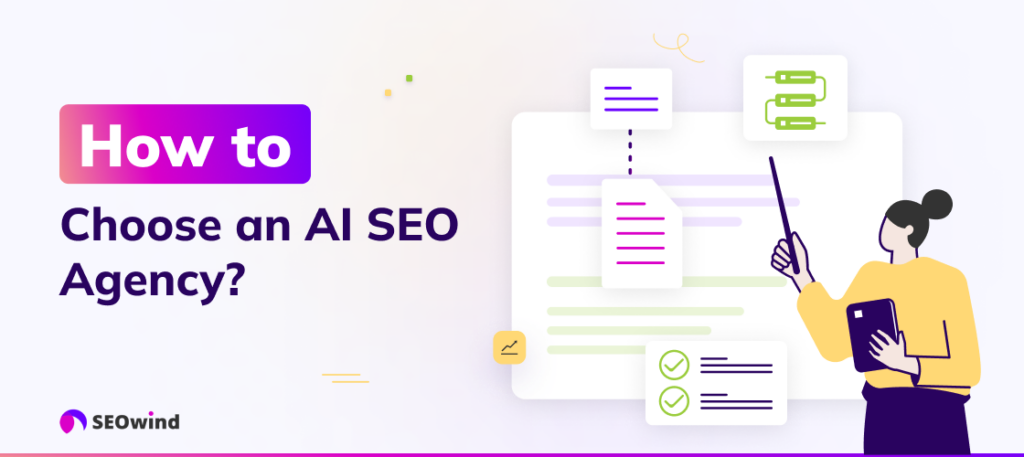
Selecting an AI SEO agency requires evaluating both technological capabilities and strategic approach. The following criteria will help identify partners who can deliver sustainable results:
Technical Expertise and Methodology
Look beyond general AI capabilities to understand specific methodologies:
- Ask about their content development system and how AI integrates with human expertise
- Evaluate their technical SEO automation capabilities
- Understand their approach to algorithm updates and adaptation
- Request examples of their data analysis and reporting frameworks
Agencies should have transparent, documented processes that demonstrate how they’ve systematized their approach rather than using AI tools ad hoc.
Industry Experience vs. Problem-Solving Capability
While industry experience provides valuable context, problem-solving ability is often more important:
- Seek evidence of innovative approaches to challenging SEO problems
- Ask how they’ve adapted strategies when initial approaches didn’t deliver results
- Evaluate their process for learning about new industries or products
- Request examples of how they’ve transferred successful strategies across different sectors
Avoid agencies suffering from the Einstellung Effect, where past success methods prevent innovative thinking about new challenges.
Balancing Strategy with Quick Wins
Effective agencies operate on parallel tracks:
- Comprehensive strategy development based on deep market research
- Immediate optimization of “low-hanging fruit” opportunities
- Clearly defined milestones showing progress toward long-term goals
- Regular demonstration of value through visible performance improvements
This balanced approach maintains stakeholder confidence while building toward sustainable results.
Transparent Process and Deliverables
Leading AI SEO agencies provide clear service frameworks:
- Defined phases of work with specific deliverables for each
- Regular reporting on both activities and outcomes
- Transparent explanation of AI systems used and their purpose
- Clear division of responsibilities between AI and human team members
This transparency ensures alignment of expectations and facilitates effective collaboration.
Compliance and Ethical Considerations
As AI usage increases, ethical implementation becomes increasingly important:
- Ask how the agency ensures compliance with Google’s helpful content guidelines
- Understand their approach to E-E-A-T principles within AI-assisted content
- Verify their data usage policies and privacy protections
- Confirm their approach to content originality and plagiarism prevention
Reputable agencies have clear policies that ensure their AI usage enhances rather than undermines content quality.
Service Packages and Typical Deliverables
AI SEO agencies typically offer structured service packages with clear deliverables at each phase:
Discovery and Strategy Phase
Initial engagement typically includes:
- Comprehensive technical SEO audit with AI-powered analysis
- Competitor benchmarking across key performance indicators
- Keyword opportunity analysis with intent mapping
- Content gap analysis identifying priority topics
- Strategic roadmap with phased implementation plan
Foundation Building Phase
Early implementation focuses on:
- Technical SEO optimization addressing priority issues
- Content framework development with topic clusters
- Initial content development for high-priority opportunities
- Analytics configuration for performance tracking
- Baseline link profile enhancement
Expansion and Optimization Phase
Ongoing work typically includes:
- Regular content production following established frameworks
- Continuous technical monitoring and improvement
- Performance analysis with strategy refinement
- Link-building and digital PR activities
- Regular reporting on KPIs and progress
Advanced packages may include:
- Custom AI model development for specific business needs
- Integration with CRM and marketing automation systems
- Specialized content for different audience segments
- International SEO optimization for multiple markets
- Advanced competitive intelligence and monitoring
While exact packages vary between agencies, this structured approach ensures systematic progress toward clearly defined goals.
Addressing Common Client Concerns About AI SEO
Recent industry surveys have identified several recurring concerns about implementing AI SEO strategies. Understanding and addressing these concerns is essential for successful agency-client partnerships:
Content Quality and Authenticity
Concern: 65% of SEO professionals worry about using AI to maintain content authenticity and quality (Source: SEOclarity)
How Leading Agencies Address This:
- Implementing robust human review processes for all AI-generated content
- Developing custom training for AI systems based on brand guidelines
- Incorporating original research, expert insights, and unique perspectives
- Using AI primarily for structure and research rather than final writing
- Demonstrating quality through performance metrics like engagement and conversion
Data shows that properly implemented AI content systems can improve quality metrics, with 73% of marketers reporting increased engagement after implementing AI in their SEO campaigns.
Security and Data Privacy
Concern: Nearly 59% of professionals express concern about how AI tools handle sensitive data (Source: Ellucian’s AI Survey).
How Leading Agencies Address This:
- Utilizing enterprise-grade security protocols for all AI systems
- Implementing clear data usage policies with client approval processes
- Providing transparency about which data enters AI training systems
- Using on-premise solutions for sensitive industries where appropriate
- Regular security audits and compliance verification
Brand Safety and Consistency
Concern: 30% of marketers view AI as a risk to brand safety, while 15.6% worry specifically about brand inconsistency (Source: Statista).
How Leading Agencies Address This:
- Developing detailed brand guidelines that inform AI content generation
- Creating custom datasets for AI training using approved brand materials
- Implementing multi-stage quality control with brand compliance checks
- Regular tone and voice calibration to maintain consistency
- Performance monitoring specifically for brand perception metrics
These systematic approaches ensure that AI enhances rather than undermines brand positioning and safety.
AI SEO and Compliance with Google Guidelines
When implementing AI SEO strategies, a critical consideration is ensuring alignment with Google’s helpful content guidelines and broader quality standards. Leading agencies have developed specific approaches to maintain compliance:
E-E-A-T Integration
Experience, Expertise, Authoritativeness, and Trustworthiness (E-E-A-T) principles guide Google’s content evaluation. AI-enhanced content maintains these standards through:
- Clear attribution of expertise through author profiles and credentials
- Integration of verified facts and data from authoritative sources
- Structured review processes by subject matter experts
- Transparent disclosure of content creation methods where appropriate
Helpful Content Optimization
Google’s helpful content system rewards material that provides genuine value to users. AI SEO maintains this focus by:
- Prioritizing comprehensive answers to user questions over keyword density
- Structuring content around actual user needs identified through search analysis
- Ensuring appropriate depth and breadth for the topic’s complexity
- Avoiding unnecessary content expansion that doesn’t serve user intent
As Brian Dean, founder of Exploding Topics and Backlinko, notes: “High-performing SEO teams are now relying on AI co-pilots in different areas of their workflows… This is how my team quickly compiles stats or generates keyword lists for new posts that traditional keyword tools would not include.”
User Experience Enhancement
Beyond content quality, AI SEO improves overall user experience through:
- Predictive page speed optimization based on Core Web Vitals
- Dynamic content presentation optimized for different devices and contexts
- Intelligent internal linking to facilitate user journeys
- Personalization features that increase relevance to individual users
These approaches ensure that AI SEO enhances rather than undermines content quality and user experience, maintaining compliance with Google’s increasingly sophisticated quality evaluation systems.
Best Practices for Working with an AI SEO Agency
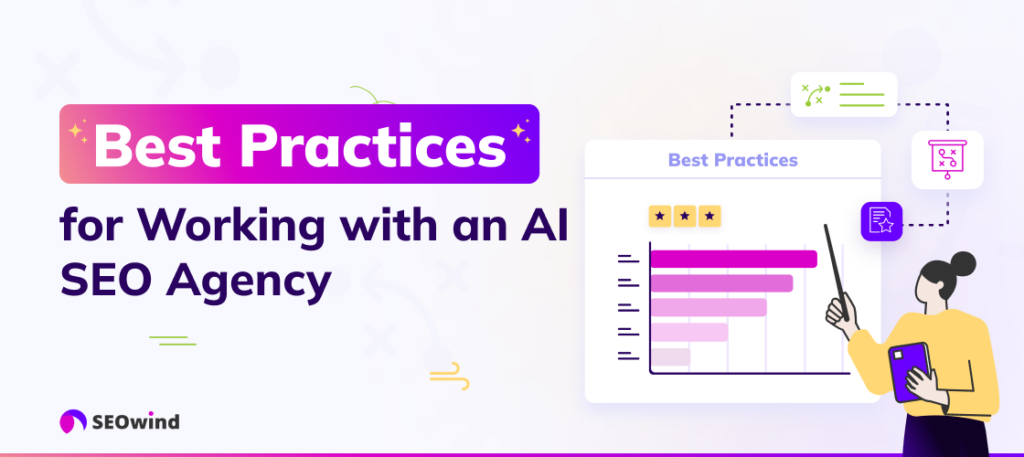
To maximize the potential of your collaborations with an AI SEO agency, it’s vital to adopt several best practices. Proper implementation helps achieve optimal results and ensures you make the most out of this technology-driven service. So, let’s delve into some tried-and-true strategies that can enhance your engagement with an AI SEO agency.
Set Clear Expectations
Understanding what both parties aim to achieve in any professional relationship is paramount. This also rings true when partnering with an AI SEO agency. Be sure to outline your goals from the outset, including targeted ranks on search engine result pages (SERPs), desired organic traffic volumes, or improvement in content quality checks using AI.
Understand the Technology
Brushing up on the basics of SEO artificial intelligence will help you better comprehend how these agencies operate and deliver results. You don’t need intricate knowledge, just enough to understand how tools like machine learning and data analytics revamp your digital presence.
Regularly Monitor Results
Subscribing to an AI SEO service without tracking performance would be fruitless. Results must be regularly reviewed and analyzed through metrics like SERP ranking over time, website traffic numbers, click-through rates (CTR), and more.
Communicate Effectively
Keep open lines of communication with your chosen agency. Regular interactions help address issues as they emerge, facilitate necessary adjustments regarding new algorithm trends, and foster mutual trust between you and the AI SEO agency.
Implementing these key strategies invariably contributes towards a successful relationship with your selected provider while stimulating scalable growth within your digitized exposure.
The Future of AI in SEO
Integrating artificial intelligence into SEO isn’t just a tech shift but a fundamental transformation in achieving and maintaining digital visibility. While traditional SEO approaches still have value, the measurable advantages of AI-enhanced methods are compelling:
- Faster implementation and adaptation to algorithm changes
- More comprehensive data analysis leads to better strategic decisions
- Significantly improved content scaling capabilities
- Higher ROI through efficiency gains and performance improvements
The most successful implementations share a common characteristic: they view AI not as a replacement for human expertise but as a powerful amplifier within structured systems. The CyborgMethod™ and similar hybrid approaches represent the industry’s future, where technology and human creativity work together to deliver unprecedented results.
For businesses looking to scale their digital presence, partnering with an AI SEO agency that demonstrates structured methodology, transparent processes, and measurable results offers a significant competitive advantage in an increasingly complex digital landscape.
